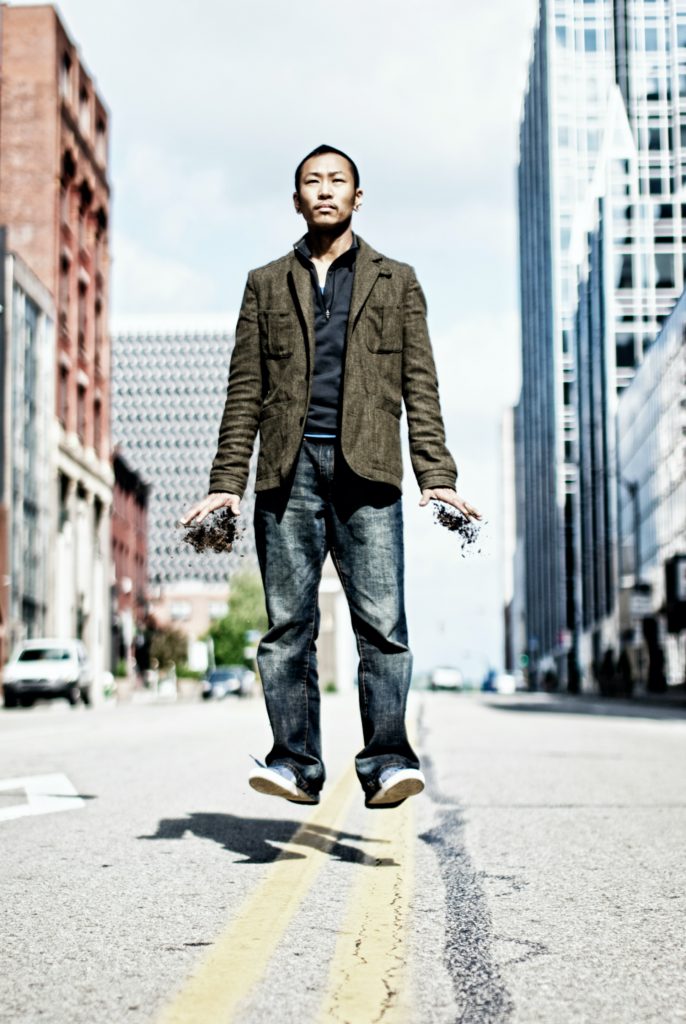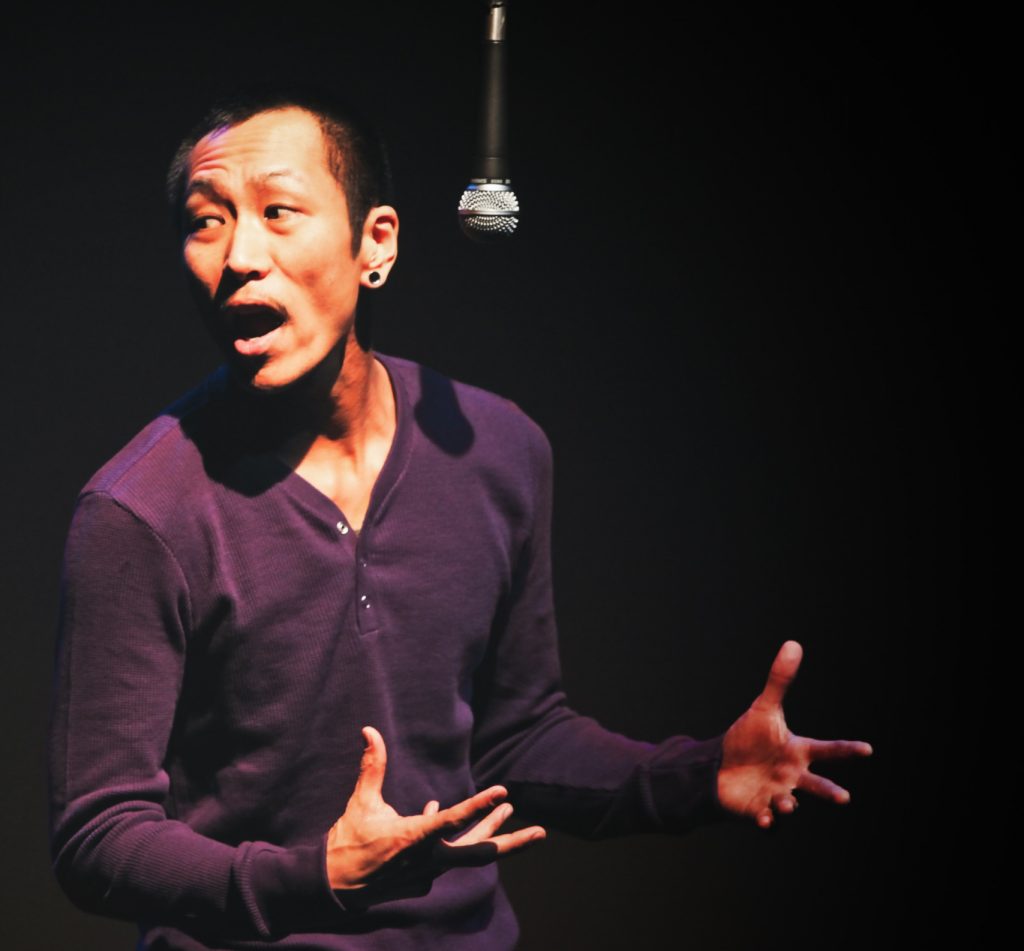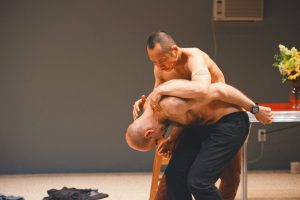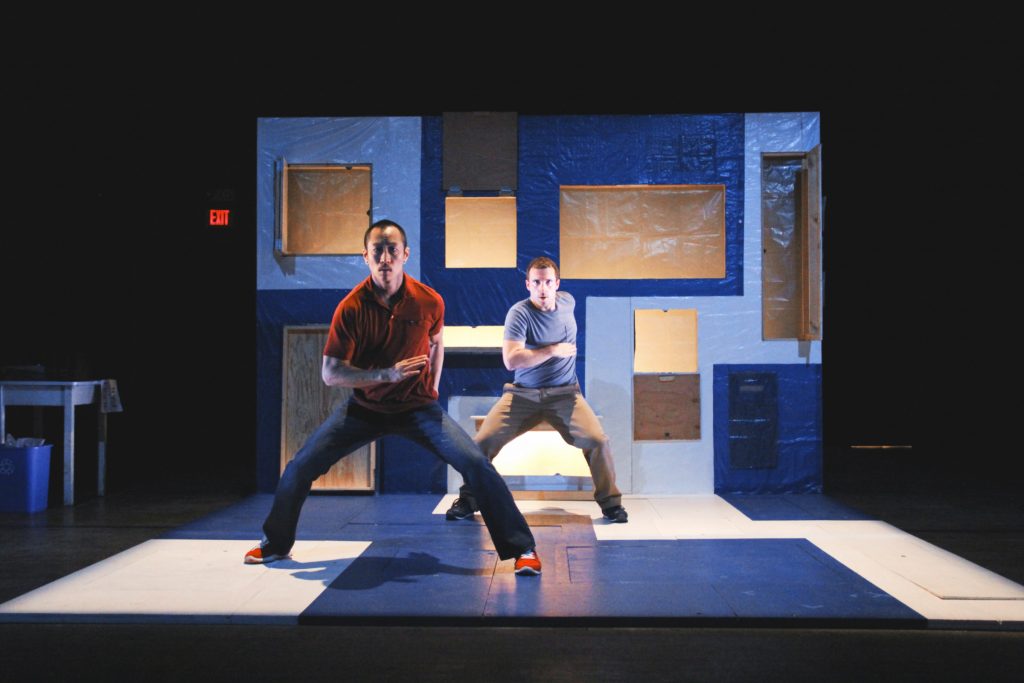An interview with theater artist Makoto Hirano reveals his thoughts on gun culture and its impact on Asian Americans and Asian immigrants.
By Rob Buscher, Contributor

Performance theater artist Makoto Hirano, pictured in a promo image for “Boom Bap Tourism,” is developing his newest project “The Great American Gunshow.” (Photo: Joshua Sweeny)
In the aftermath of the March 16 Atlanta Spa Shootings in which six of the eight people killed were Asian women, the Asian American community has become deeply engaged in the national debate around gun ownership and gun law reform.
Although this particular event brought light to the ways that Asian women have been specifically targeted as victims of anti-Asian hate, the Atlanta shootings are part of a much larger trend in gun violence that our country is grappling with currently.
According to Washington, D.C.-based nonprofit Gun Violence Archive, there have been a total of 147 mass shootings in 2021 to date. In the past month alone, at least 45 mass shootings occurred. Of particular note is the April 15 shooting at a FedEx facility in Indianapolis where eight people were killed — four of whom were of the Sikh faith.
Asian Americans are not the only targets of attacks like these, but the recent prevalence of anti-Asian hate incidents has made these fears more pronounced among many community members who feel especially vulnerable at this time.
A parallel trend has also been observed during the pandemic, showing an increase in gun ownership by Asian Americans. This comes at a time when gun sales have gone up across the board.
According to data from the National Shooting Sports Foundation, a firearms trade association and lobbying group, approximately 8.4 million first-time gun buyers were reported since the pandemic began.

Before beginning his theater career, Makoto Hirano enlisted in the U.S. Marine Corps. (Photo: Bill Hebert)
Japanese American theater artist Makoto Hirano (whom JACLers might remember from the 2018 National Convention where he led a theater workshop; see related story here.) co-leads Team Sunshine Performance Corp., a Philadelphia-based company of theater and dance creators.
Since 2020, Team Sunshine has been developing a project titled “The Great American Gunshow,” which addresses many of these current issues related to gun ownership and whether Asian Americans feel safe in today’s society.
The son of Shin-Issei immigrants raised in Chicago, Hirano is no stranger to guns, having served in the U.S. Marine Corps prior to getting his BFA in dance at Temple University. Under Hirano’s leadership, this project seeks to inspire meaningful dialogue among audience members from both sides of the gun reform debate.
I had a chance to sit down with Hirano recently for an interview about “The Great American Gunshow” and his long-term ambitions for the project.
ROB BUSCHER FOR THE PACIFIC CITIZEN: What is your relationship to firearms and how did you come to this topic?
MAKOTO HIRANO: My relationship to firearms, specifically the actual physical, tangible thing, goes back to my teenage years when I was living that street hood gangbanger life. There were pistols being passed around at house parties. I shot my first pistol — I guess I was 15, maybe I was 14.
Then I joined the military, and there’s a lot of learning of nomenclature and different types of weapons and how to fire them. So, my relationship to actual physical, tangible firearms, machine guns and grenade launchers — I feel familiarity to a point of pride.
It’s something that only in investigating this piece I started to realize that there’s a sort of pride around this, and the reason for it is because it’s just one of the many things on the shelf of things that I can say I own.
That’s my passport right, that’s my pass to being included, to be seen as American. … So, there’s a little bit of, “Can I be let in now?” feeling.
During that time in the Marine Corps, of course I learned more about firearms, and I gained closeness to it and also a healthy respect and fear for them as well because we were all trained to understand and respect these things that kill people.
Now, in my later adult years in my relationship to firearms, I’m not a gun owner, and I know very few gun owners because my bubble is so left-leaning. A majority of those people either have a healthy fear of firearms or are completely against having a firearm in their home. I feel like I’m a little bit of an anomaly because I love guns.
That said, I don’t think that it’s necessary for anyone to own an AR-15, but I don’t think that it should be illegal because there’s nothing wrong with the AR-15, it’s just a thing — just metal and hard plastics and springs.
Part of my motivation around wanting to make this piece is the conversation that I’m experiencing in my arts-related bubble, left of center, who don’t know anything about guns or gun laws, but know they’re against it.
When I hear from the other side — the pro-Second Amendment, pro-gun rights, pro- constitutional carry — those people are not wrong when they’re like, “The people wanting to reform and take our guns away, they don’t know anything about guns and how they work.”
BUSCHER: Would you consider yourself pro- or anti-gun — do you feel closer to one side of this debate?
HIRANO: I’m not pro or anti necessarily — I’m not any of those things. I haven’t really made up my mind about stuff, and if I’m going to buy a gun and become a gun owner, I’d love to do it on my own time when it feels comfortable. … Many of my friends who I’ve talked to, they’re like, “Do I have to?” Especially after the sort of nationwide social unrest and fighting for justice and fighting to not have to live in fear all the time.
One of those paths is to go buy a firearm, go and become a registered firearm owner. That sucks man — that’s the worst way to become a gun owner. That’s the last way I want to become a gun owner.
But with that said, I’m not a pro or anti anything. I concede to all sides, and I don’t disagree to a healthy amount. So then hearing both sides — neither of those sides of the argument care to listen to the other side. On opposite ends, people are just yelling.
I can choose to pick a side. I can choose to work toward better legislation for one side or the other. Instead, I chose to inquire about it through an art piece.
BUSCHER: At its fundamental level, your project addresses questions about gun ownership and how safe Asian Americans feel. In the context of recent events, how has that changed your approach?
HIRANO: In theater making, there’s a lot of process that is hidden from public view, most of it until it’s ready to be shared, and so nobody knows what people are working on until there’s a postcard that goes out or until there’s a social media blast or something. But now in the past few weeks, I’ve gotten a lot of love for “The Great American Gunshow,” the project itself existing, and people reaching out to me in support of it, in small and big ways, and I’m grateful. But every bit of love and support I get — it feels like it ups the pressure. I guess I’m navigating that territory.
Before the show had a name, it was a catch all for everything that I was thinking about and working on as I’m thinking about being Japanese American. About race and ethnicity and about equality, I’m thinking about that all the time as I’m also thinking about firearms and guns and reform and divide. Especially since Trump. But it’s been going on for a bit this divide on firearms and gun law reform. All this bubbled up, and then it got kind of boiled down until these two things remained: race and ethnicity and safety and guns.

Makoto Hirano in “The Sincerity Project #3” (2019), created by Team Sunshine Performance and directed by Alex Torra. (Photo: Joanna Austin)
I remember in August or September 2020 there being more than one person on my Facebook feed asking the wider Facebook, “Does anybody know where in X state I can buy bullets?”
I was like, “How many do you have now?” Then the person, the original poster was like, “Not enough.” They didn’t say how many, they said, “Not enough.” What does that even mean? Does it mean you have one bullet, you just need a handful? Probably not.
You know if you’re a hobby shooter, you go to the range and you want to pop off a bunch of rounds — I get it. But the sense that we’re running out, “I need to get some now, just in case,” it does activate that in me. Like, “Whoa, they’re running out of bullets — that’s how many people are arming themselves and stockpiling.” I can’t ignore that, and it feels like it’s just closer and closer to my home.
This is all happening at the same time during the pandemic, but also the Trump administration era with this rhetoric around gun law reform and xenophobic rhetoric. It was a very confusing period of time 2016 and onward. That’s all happening when I’m questioning my safety and questioning whether I need to arm myself. In tandem, my Asian American brothers and sisters are experiencing so much violence and so much anger directed toward them.
The impact that I want engaging in this art project is bigger than me wanting to be recognized for my art. It starts to make me wonder, “What if we can create this project as a way to have discourse around this in a more real exchange kind of way?” And then call it art. What if it’s just masking our project in theater-dance whatever, but what we’re actually doing is something a little deeper than that. That’s kind of where I’m going with this project.
BUSCHER: How are you going to proceed from here, and when will you start having conversations like this with prospective participants?
HIRANO: It’s a little bit funding related, of course, but we have institutional partners on board. As of March 2021, we’re still in the planning admin logistics period of time and research. Combing through all the gun laws through history in the United States, so there’s a lot of that and then putting pieces in place and grant writing, so that’s where we are currently.
Bloomsburg Theatre in Bloomsburg, Pa., and Asian Arts Initiative in Philly are sort of the core partners starting off with Team Sunshine in this project. Sometime in fall 2021 we’re going to start the actual interview process and all summer, we will be planning for that: identifying who, doing the outreach, etcetera. It will take me back and forth between Philly and Bloomberg, Penn., between these two places over a period of time, which would be fall 2021 and spring 2022.
These will be interviews and facilitated group conversations. I’m hoping for a story circle style kind of exchange, where it isn’t just me and my team with one human. That’s important to get into really deep stuff, but I imagine having a wider circle of people, a lot of groups of people. Meeting with them a few times and then having them share in some of the art-making process with us.
Summer 2022, we’ll have our first public showing; for now, it’s just called a work-in-progress, two nights in Bloomberg and two nights in Philadelphia.
BUSCHER: What are your long-term aspirations for this project?
HIRANO: This is kind of the pilot phase, figuring out how we have these exchanges, how we set up these meetings, who we reach out to, etcetera. What I’m imagining for “The Great American Gunshow” in the future is that we can take all of this and work with another partner and so there’s a skeleton for the piece. We partner and have an exchange back and forth until the new content is created, and then we perform it for the people of that community and maybe each of those versions of the piece are slightly different.
The perspectives and what they’re bringing to it – also the amount of Asian people in any given community might be small, especially the more rural areas vs. urban, so that will change the narrative or what’s being said.
If we develop a new partnership in a rural environment, I want to pair that with a nearby urban component to have a toggle back and forth wherever that is, between those two places.
BUSCHER: Any last thoughts on gun culture and its impact on Asian Americans and Asian immigrants?
HIRANO: There is something here that has to do with supporting our history of encouraging individualism in the United States. It is everything to us, as a culture, as America. To me, everything has that residue on it. My hunch is that every path, if you just follow that line of inquiry all the way to the end wherever it is, it can arrive at the same thing, which is like we’re all clamoring for, hoping for, fighting for individualism.
When I put that lens on it’s everywhere in my life figuratively, and in physical form, and I think that this absolutely has to do with this project. It absolutely has to do with gun culture. Why gun culture is even a term. What an insane term, right? I think you just follow that line of inquiry of, “Why does gun culture exist? How did it become?”
I think if you just keep following that to the end, then it would be like, “Oh, I just want to live free.” That’s what I feel like it would end up with. I just want to be who I am or explore that and have freedom. What an incredible privilege to be like, “I just want to be free of all the shackles.” That’s what everybody wants, but we as Americans get to do that, and if you put that process under a microscope, then eventually what happens is this. Give people enough agency and freedom, and the privilege of getting to pursue that, and then you end up here.

Makoto Hirano in 2013’s “JapanAmerica Wonderwave,” created as a response to/reflection of the 2011 earthquake/tsunami/nuclear meltdown in Japan, as well as other disasters near and far. (Photo: Lindsay Browning)
It is within a long trajectory, but if you look at the past hundred years of gun culture, you have to zoom out a little more to look at what came before that. So, it’s really hundreds of years of supporting this idea that you can be whatever or whoever you want to be — that idea that the American dream is connected to.
How we respond to guns and gun culture was born out of something that was born out of that idea, and that is very unique to the United States. So, that’s what I think about this project.
How it may or may not relate to immigrants from other places and their experiences with guns and gun culture in the United States? I don’t know. I know I’m not there yet, but I do think that gun culture has everything to do with what’s at the heart of what America sells to its people, and it’s deep.
For more details on “The Great American Gunshow,” visit Team Sunshine’s website at https://www.teamsunshineperformance.com/gunshow.html.



